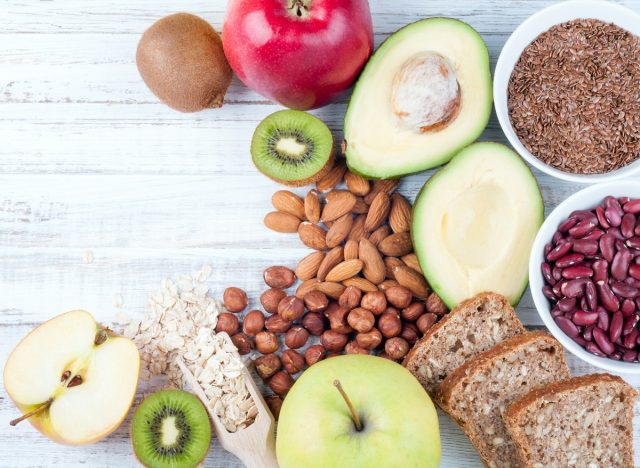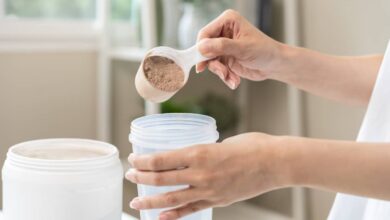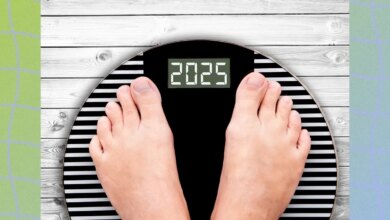6 Tips for Women To Lose Belly Fat & Keep It Off

Every woman is beautifully unique in her own way. But one thing just about every woman despises? Dreaded, unwanted belly fat. It’s usually uninvited and is pretty stubborn about leaving. Who wants that kind of company? If the answer is a hard “not me,” get ready to take some notes. Eat This, Not That! got the scoop from Mike Bohl, MD, MPH, ALM, a member of our Medical Expert Board and a certified personal trainer and nutrition coach who has helped develop the Body Program at Ro. With his help, we’re here with six great tips for women to lose belly fat and keep it off.
As women age, muscle mass declines, and fat increases. Belly fat is especially common, which is caused by lower estrogen levels, the Mayo Clinic explains. The result? Women typically put on extra weight around their waistlines. In the winter especially, you’re likely stuck indoors and less active, which does not help the situation. But spring is in the air, which means you may be inspired to work on losing belly fat—and keeping it off forever.
Ahead, Dr. Bohl provides six rules to weave into your lifestyle. Keep in mind, consistency with any exercise plan is key to achieving results. So if you’re ready, let’s get started—and next, don’t miss 5 Flat-Belly Exercises To Look Younger & Fitter in Your 40s.
1. Have a solid cardio routine on deck.

Cardio can—and should—be your new best friend. Dr. Bohl explains, “When it comes to losing weight and keeping it off, having a solid fitness routine is key.”
And research backs this up. According to a study by Duke University Medical Center, performing aerobic exercise is the most productive method to get rid of the abdominal fat that poses major health risks.
There are so many ways to perform cardio, and you can easily pass the workout time with a friend. Fit some in at a minimum of five days each week, Dr. Bohl suggests.
2. Perform regular strength training.

Strength training is another crucial component of a workout regimen when it comes to losing weight. “Strength training burns calories while you’re at the gym and while you’re home recovering. If you’re going for a toned look, strength training is how you get there,” Dr. Bohl says.
3. Consume high-protein foods.
Adding lean protein to your meals is an excellent way to feel full without consuming a lot of extra calories. Dr. Bohl points out, “Lean proteins—like chicken, fish, and plant-based proteins—are an excellent source of nutrition and will pair well with your strength training.”
4. Maintain a diet of healthy carbs and fats.

Weight loss in general is all about a calorie deficit. You have to eat fewer calories than you burn.
Dr. Bohl tells us, “There’s been a lot of research around whether a low-carb or low-fat diet is better for weight loss … When you’re designing your meal, instead of stressing about carbs versus fats, just focus on eating healthy versions of both. Healthy carbs include whole grains, and healthy fats include monounsaturated and polyunsaturated fats.”
If you’re wondering which carbs are the healthiest options to support your weight loss efforts, UPMC Health Beat explains veggies, fruits, and whole grains are all solid choices, as they’re full of dietary fiber, vitamins, and minerals. And when it comes to healthy fats, “good” unsaturated fats—aka the monounsaturated and polyunsaturated fats Dr. Bohl notes—include foods like fish, nuts, seeds, and vegetable oils, according to the Harvard T.H. Chan School of Public Health.
5. Plan a “cheat” day each week.
You may be surprised to hear that cheat days are totally fine every so often. It’s also a pretty important way to assure you will keep off the weight once you take it off.
“The best diet is the one you actually stick to, and if you don’t allow yourself to have any flexibility, you might just give it up altogether. So, if you really want sustained weight loss, don’t worry about ‘breaking the rules’ here and there. As long as, overall, you stick to your outlined routine, you’ll be happy with the results,” Dr. Bohl stresses.
6. Discuss your weight loss goals with your doctor.
Weight loss is really about maintaining a solid diet and exercise routine. “But medical science is also realizing how important individual physiology is to weight status as well. If you feel like you’ve been doing all of the right things to lose weight but they’re just not working, talk to your doctor,” says Dr. Bohl.
Your doctor may be able to discuss medications that can be effective in helping you achieve permanent weight loss.
Alexa Mellardo





